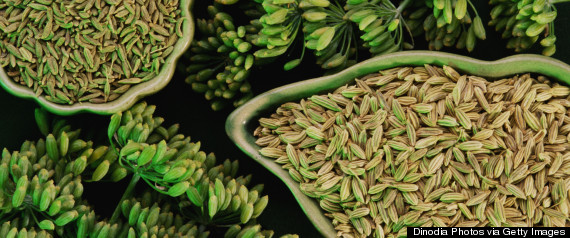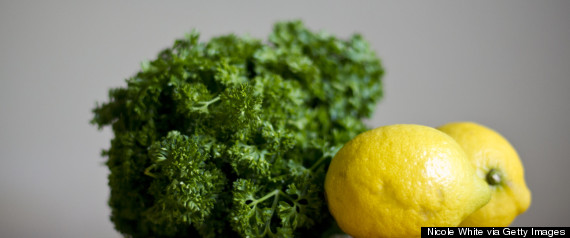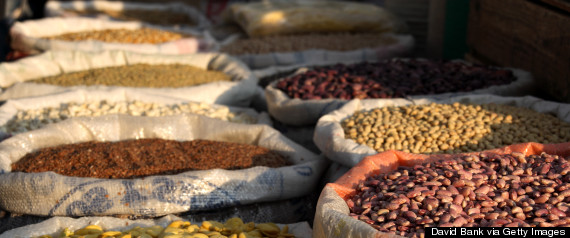
By Corrie Pikul
Feel like your abdomen is suddenly filled with helium? Here's how to gently and naturally decompress -- and how to prevent it from happening again.
1. Try the breath freshener that's also a bloat buster.

Leave the mints for your grandmother: Fennel seeds are a better, more natural digestif, says Robynne Chutkan MD, a Maryland-based gastroenterologist and the author of Gutbliss: A 10-Day Plan to Ban Bloat, Flush Toxins, and Dump Your Digestive Baggage. They also helps relax your digestive tract and eliminate gas, she says, and enhance the production of gastric juices that aid digestion. Another idea: make fennel tea -- boil whole seeds in water, then strain the tea to remove seeds before drinking
2. Find the air that has been sneaking into your body, and head it off at the pass.
Swallowing air is one of the most common causes of bloating, says Chutkan. Try this test: Put your hand just above your tummy, where your sternum ends. If it's sticking out and feels tight like a drum, then you've probably been taking in too much air. Chutkan has a long list of culprits: Eating while talking on the phone; breathing through your mouth (hard to avoid when you're giving a speech or presentation); chewing gum or sucking on hard candies; drinking through a straw; gulping fluids or racing through meals. It's impossible to divert all air through the correct nasal passages, but maybe put aside straws, hard candies and gum until you've deflated a bit.
3. Tame your sweet tooth.

Sugar, especially high-fructose corn syrup, is the preferred food for gas-producing bacteria in the GI tract, says Chutkan. It's also beloved by yeast species like candida, and too much of it can lead to a bacterial imbalance called dysbiosis, a major cause of bloating. The amount that most of us can comfortably process in a day is only about 50 grams (a 12-ounce can of cola has 33 grams; a drinkable low-fat yogurt could have 22 grams). Chutkan says that about one-third of the population has something called fructose malabsorption, which means that an excess of about 25 grams of sugar is fermented by colonic bacteria -- and results in lots of stinky gas.
4. Don't let anything get between you and your water (not even your yoga teacher).
You eat more leafy greens than a koala bear (juiced, blended, tossed, sautéed), and you never miss a hot yoga class. Yet by the late afternoon you feel like you've gained a few pounds -- all in your midsection. Chutkan says that the problem is most likely dehydration. While exercise moves food through your system, it also causes you to sweat out fluids (as much as a liter and a half in some yoga classes, says Chutkan). One of the worst combinations for bloating is a cardio-yoga combo, because so many yoga teachers are dogmatic about restricting drinking during their class. Be sure to adequately hydrate before working out. And if you're eating fiber, Chutkan says you should be drinking at least 2 liters of water to prevent all that fiber from clogging your system and causing a backup.
5. Eat gassy vegetables...just in moderation, and with this type of fruit.

It's nature's cruel irony that many of the healthiest foods out there are also some of the hardest to digest. You may have heard about the low-FODMAP eating plan, which steers you away from foods that contain high levels of fermentable oligo-, di, mono-saccharides and polyols -- basically, carbohydrates that aren't easily absorbed in the small intestine. This way of eating has been proven to help, says Chutkan -- but it's complicated (cherries are high in FODMAPs, yet strawberries and raspberries are low...?!). Chutkan doesn't like to tell patients to avoid healthy-yet-gassy foods altogether. Instead, she recommends portion control (as in one ingredient in a soup, for example), as well as spritzing veggies like broccoli, kale and cauliflower with lemon juice, which, she says, stimulates digestive enzymes.
6. Get your probiotics from a more reliable source.
We hear a lot about yogurt's probiotic benefits, but Chutkan says that most brands of yogurt you find at the store don't have enough live bacteria to make much of a difference to your GI tract (they also tend to be high in sugar, which can make bloating worse). More effective choices are kefir and fermented foods like sauerkraut, pickles and kimchi. They're loaded with the kinds of "good" active bacteria that displace bad bugs in the gut, and can help ease bloating, gas, diarrhea, constipation and other digestive issues.
7. Change your approach to beans.

Beans are not the enemy, says Chutkan -- they just require a little extra TLC. Choose dried beans over the canned variety, which tend to be covered in congealed starch, salt and other preservatives that are challenging to digest. Soak them overnight, then cook with a sea vegetable like kombu, which, Chutkan says, has natural enzymes that break down some of the indigestible sugars before the food even gets into your body. Finally, recognize that beans and their notorious oligosaccharides are hard for everyone to break down completely, Chutkan adds, so a little bit of gas is natural.
Related
Before You Go



